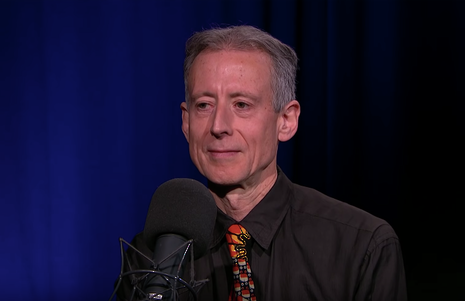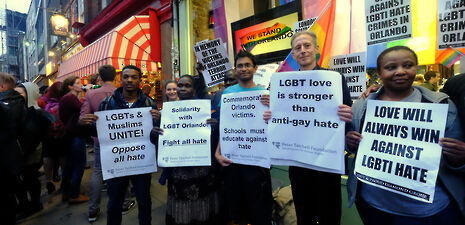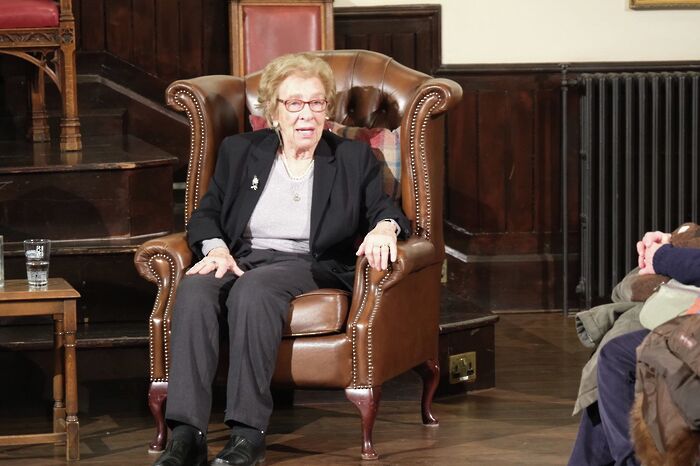Peter Tatchell: ‘We are in the midst of an incredibly exciting and inspiring gender revolution’
Owen Dowling talks to Peter Tatchell about LGBT+ history and how he envisages the future of the movement

This year marks the fiftieth anniversary of the Stonewall riots in New York, a key moment in LGBT+ history which sparked the establishment of Gay Liberation Fronts around the world -precipitating a global struggle for the social and legal emancipation of lesbian, gay, bisexual and transgender people. Dubbed ‘Saint Peter’ by his fellow activists, and a ‘gay gangster’ by Robert Mugabe, the veteran activist Peter Tatchell has long been a prominent figure in the fight for LGBT+ rights. From his youth in the year of Stonewall, through his membership of the Gay Liberation Front in the 1970s, the experience of the AIDS crisis and involvement in the direct action group ‘Outrage!’, Tatchell’s activism has continued to the present day, when some argue LGBT+ people have finally achieved formal equality in society.
I sat down with him before his speech in the Cambridge Union chamber, which was flying an LGBT+ flag for the first time, to discuss his experiences within the LGBT+ rights movement, as well as his views on the successes of that struggle, on direct action, on LGBT+ rights around the world, and on the prospects for trans liberation in the coming years.
Describing his experiences as a teenager in the embryonic gay rights movement at the end of the 1960s, Tatchell recalls predicting, “based upon the experience of the Black Civil Rights movement in America, that it would probably take about fifty years to win full legal equality in western countries like Britain. It was a guesstimate, but it’s proved to be just about right.”
Indeed, it was not until the 2000s that the push for LGBT rights in the UK tipped over into serious legislative change - with a series of reforms passed under the post-1997 Labour government including the repeal of Section 28, the equalisation of the age of consent, the introduction of civil partnerships, and protections against workplace discrimination. 2013 saw gay marriage passed in Parliament under the coalition government. Tatchell describes the process by which “all the major anti-gay laws were repealed within a space of 15 years” as “the fastest, most successful law reform campaign in British history, maybe in world history. There has never been a disadvantaged, marginalised community that has experienced such a transition to equality in such a short space of time.”
“There has never been a disadvantaged, marginalised community that has experienced such a transition to equality in such a short space of time”
Tatchell emphasises this legal ‘transition to equality’, beginning in 1999, represented the first batch of gay rights legislation passed since “the partial decriminalization of male homosexuality in England and Wales in 1967.” In the intervening decades, “we got basically nothing. All the lobbying, the campaigning was rebuffed by successive governments both Labour and Conservative.” There were even periods of particularly reactionary opposition, especially from the Thatcher government which in 1988, against the backdrop of the AIDS crisis, passed Section 28 - prohibiting local authorities from ‘promoting homosexuality’ or ’teaching in any maintained school of the acceptability of homosexuality as a pretended family relationship”. It was within this context, Tatchell argues, that the extra-parliamentary movement for gay rights emerged, and took on a necessarily radical character.
On the specific campaign strategies during this period, he points to a “synergy” between the complimentary dynamics of political lobbying for reform, as advanced by Stonewall, and a tradition of direct action - which included lesbian activists abseiling into the House of Lords to protest Section 28, and Tatchell’s group ‘Outrage!’ These organisations, he argues, enjoyed a dialectical relationship “a bit like the suffragists and the suffragettes”, which helped shift the overton window of political discourse towards one conducive to gay rights legislation. Tatchell himself has been prominently involved in direct action, and while acknowledging that he personally has “played a significant role in the battle for LGBT+ rights over the last five decades”, he insists that “…it’s never been me alone. I’ve always been working in collaboration with other activists, be they in the Gay Liberation Front of the 1970s, or ‘Outrage!’ in the 1990s.”
Indeed, he sees the gains made for LGBT+ equality in the last decades as achievements for which “no one individual organization can claim credit.” They were the “result of the cumulative, collective efforts of tens of thousands of LGBT+ people around the country” - demonstrating, in his view, that “it is only through collective action that social change comes.”
Moving onto the subject of global LGBT+ activism, he argues that it is important to recognise that, while enormous steps have been made for gay rights in the UK, much of Europe, the US, and elsewhere, there remain vast swathes of the globe in which homosexuality is criminalized - with The Guardian reporting in 2017 that there are eight countries in which homosexuality can result in the death penalty. Telling me he has always seen LGBT+ liberation as a necessarily internationalist project, his activism has taken him from demonstrating for gay rights in East Germany as a young man, for which he found himself arrested by the Stasi, to repeated protests in Putin’s Russia. However, he again insists, this has not been an individual quest - his international action has always been in conjunction and solidarity with activists in these countries.
Having repeatedly travelled to Russia, which under President Putin has maintained and instituted a series of anti-gay laws including a 2013 ban on so-called ‘homosexual propaganda to minors’ (employing language reminiscent of Section 28). The country has seen an epidemic of anti-gay vigilante violence and Tatchell has staged numerous protests - including in 2007 at which he was “set upon by neo-nazis” he soon realised were either in fact “police agents in plain clothes, or were neo-nazis operating in collaboration with the police.”

Again insisting that his demonstrations have been “at the invitation of Russian LGBT+ activists” who regularly face this form of state violence, he tells me that as a high-profile activist with a sizeable media profile, he has been “able to bring British and international media to Moscow” to “help highlight the abuses, the homophobia, biphobia and transphobia of their government.”
This past summer, during a period of international media attention due to the World Cup, Tatchell travelled once again to Russia, staging a one-person protest outside the Kremlin with a placard reading: ‘Putin fails to act against Chechnya torture of gay people.’ Elaborating on the situation in Chechnya, the semi-autonomous province within the Russian Federation where there have been reports of anti-gay persecutions, he tells me that “the first wave of anti-LGBT+ witch-hunts in Chechnya began this time last year. It resulted in dozens of known or suspected LGBT+ people being arrested, detained without trial, tortured and in some cases murdered.”
Despite a brief easing of the campaign after international outcry in mid-2018, the persecutions began again in earnest as of January 2019, with the BBC reporting around that 40 people have been imprisoned - two of whom are believed to have died under torture.
Despite the contested nature of the balance of federal and regional authority in Chechnya, Tatchell unequivocally states that “I hold President Putin directly and personally responsible for what is going on. He is the president of Russia, Chechyna is part of the Russian Federation, and he could act to stop these pogroms, but he won’t. He is colluding with the Chechen leader Kadyrov” who has claimed the “ removal” of LGBT+ Chechens is necessary to ‘cleanse our blood’. It is clear, he argues, that Russian LGBT+ activists, facing an effective ultra-conservative coalition between the “hardline homophobic Russian Orthodox Church…far-right and ultra-nationalist lobbies” under the umbrella of Putin’s repressive government, have a serious, protracted struggle ahead of themselves in the campaign for LGBT+ liberation in Russia.
We conclude with a look to the future for LGBT+ rights in the UK. Writing for the Guardian, Tatchell once described the outlook of the Gay Liberation Front of his youth upon gender-norms as that of “sexual liberationists and social revolutionaries, out to turn the world upside down...GLF’s main aim was never equality within the status quo….We sought a cultural revolution to overturn centuries of male heterosexual domination.”
Given this, I was interested to know his perspective on the history, present situation of, and prospects for, trans rights in the UK. With ideas challenging traditional conceptions of gender and identity, as well as particular issues facing transgender people, becoming increasingly visible in the public discourse, Tatchell argues that “we are in the midst of an incredibly exciting and inspiring gender revolution, spearheaded by trans people and those who identify as gender-fluid or non-binary. This is a revolution in human consciousness, challenging orthodox ideals of male and female, masculine and feminine.” However, he concedes, this gender revolution is at a relatively early stage compared to the battle for lesbian and gay rights. “I think bisexuals have actually also often been left behind as well.
“I think we are in a period of necessary catch-up” with trans issues, despite having once been at the forefront of the Gay Liberation Front, having “dropped off the agenda” of many gay rights organisations in the 80s and 90s, and now finally breaching into the mainstream.
“This is a revolution in human consciousness, challenging orthodox ideals of male and female, masculine and feminine”
Of course there has, perhaps inevitably, been a cultural backlash to this increasing transvisibility, with “trans people being demonised by the media” and “subjected to the most outrageous, outdated, ignorant and bigoted stereotypes” in a manner reminiscent of familiar tropes from the 1980s associating homosexuals with sexual predators or perversion. However, most disturbing for Tatchell is a “minority of feminists” who he argues have adopted the mistaken perspective that trans women are a threat to women’s rights and spaces, wishing that they would “try and search for the common ground between women’s rights and trans rights, instead of setting up artificial, nonsensical and bigoted divisions” between those fighting for women’s’ and trans liberation. The response of LGBT+ activists in the coming years, in the face of reactionary backlash, will shape the direction and prospects of the ‘gender revolution’.
This LGBT+ History Month, Tatchell emphasises that the freedoms queer people now have were achieved through collective struggle, and that we should recognise this to inform our efforts to maintain and extend our gains. We should continue to fight to protect what we have won, and to extend the spirit of liberation and solidarity to those around the world still unfree.
Much has been gained, but for many LGBT+ people in Britain and abroad, the struggle carries on.
 News / Right-wing billionaire Peter Thiel gives ‘antichrist’ lecture in Cambridge6 February 2026
News / Right-wing billionaire Peter Thiel gives ‘antichrist’ lecture in Cambridge6 February 2026 News / John’s duped into £10m overspend6 February 2026
News / John’s duped into £10m overspend6 February 2026 News / Epstein contacted Cambridge academics about research funding6 February 2026
News / Epstein contacted Cambridge academics about research funding6 February 2026 News / Lucy Cav students go on rent strike over hot water issues6 February 2026
News / Lucy Cav students go on rent strike over hot water issues6 February 2026 News / Corpus FemSoc no longer named after man6 February 2026
News / Corpus FemSoc no longer named after man6 February 2026










